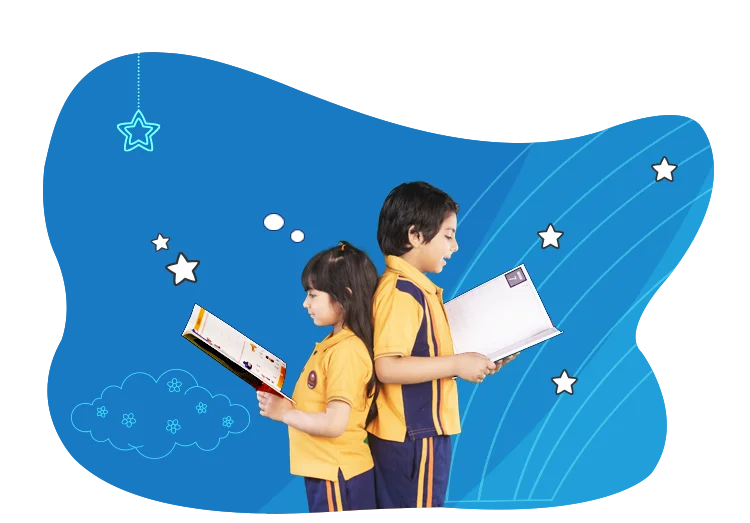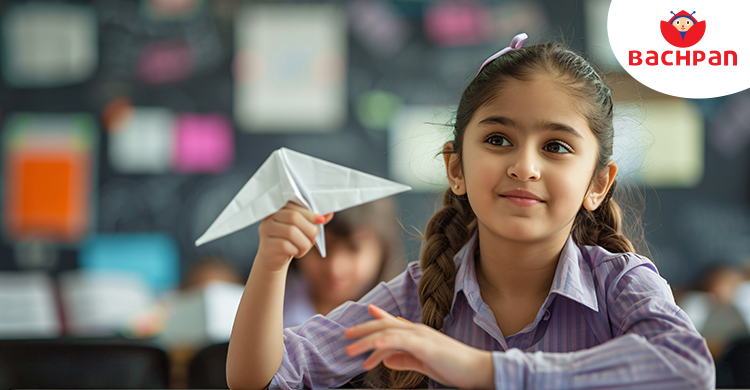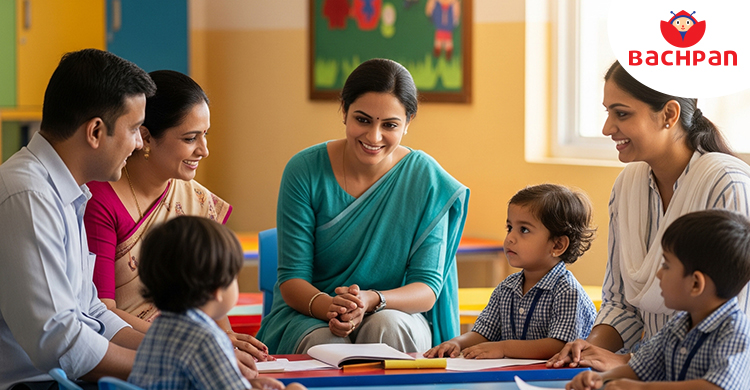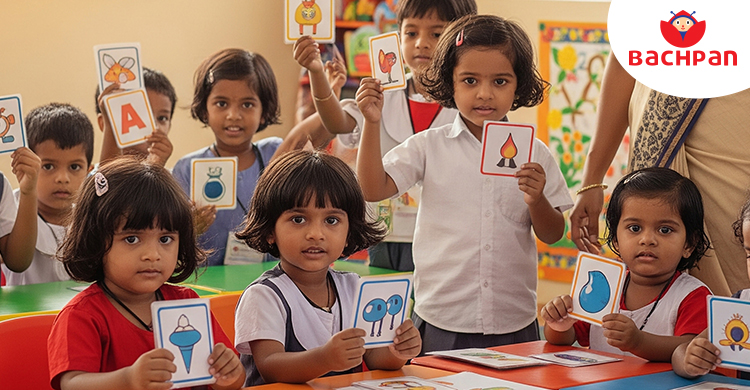50 Powerful Sight Words For Kindergarten To Build Confidence

Neha, a 4-year-old girl, listens to her father’s playful voice as he reads from a book. He says, “Everything that I do, I do it for you!” She claps happily and answers confidently when asked to pick out sight words: “Do, and you!” If you’re wondering what sight words for kindergarten are, you’re in the right place. In today’s blog, discover 50 essential words that help build early reading confidence in kids.
What Are Sight Words and Why Are They Important?
Common words that children can learn without hearing them are known as sight words. Words like “do,” “you,” and “the” come up so frequently that kids learn quickly without having to try to sound them out. As a result, it leads to strong reading and writing development. It enables little learners to understand written material without pausing to decode it. They develop more confidence as a result.
The Role of Sight Words in Kindergarten Literacy Development
Learning sight words helps children become fluent and confident readers. It strengthens their understanding without the need to decode each word individually. These frequently used words lay the foundation for reading success and contribute to vocabulary growth, making everyday communication easier and more natural.
Improving Reading Fluency and Comprehension
Sight words are high-frequency words that allow children to immediately recognise these words. This allows the little readers to process common terms, freeing up mental energy for understanding the entire text. This results in greater understanding, faster reading speeds, and more fluent reading.
Encouraging Independent Word Recognition
Children can read more fluently and rapidly if they are encouraged to recognise words on their own. When learned through engaging activities, children create positive associations with learning and reading, resulting in independent word recognition. They feel proud as they start to identify words on their own. This self-motivated development creates the foundation for successful and independent reading throughout one’s life.
Reducing Reading Anxiety in Kindergarten Children
Children become less frustrated as a result of their improved comprehension once they become familiar with sight words. They become eager to learn such words with desire and passion rather than avoiding them, which boosts their confidence.
Learn more about early literacy development in our Guide to Phonics and Reading Activities for Preschoolers.
How Sight Words Help Build Confidence in Young Learners
Sight words do more than just enhance reading skills—they build a child’s confidence as they begin to see themselves as successful readers. When children quickly recognise familiar words, it gives them a sense of achievement and motivation to keep learning.
Creates a Sense of Achievement
Mastering sight words early on gives children small wins. Each time they recognise a word without help, they feel proud of their progress. These repeated moments of success boost their self-esteem and reinforce their willingness to try more.
Encourages Participation in Reading Activities
When children can read simple texts that include familiar sight words, they are more likely to raise their hands in class, participate in group reading, or read aloud at home. This active engagement grows with every word they recognise.
Reduces Fear of Making Mistakes
One of the biggest barriers to learning is fear—especially fear of failure. Sight words reduce the pressure of sounding out every word, making reading feel more natural and less stressful for early learners.
Supports Independent Learning
Once children are confident with basic sight words, they start reading small sentences or storybooks on their own. This independence fosters a love for reading and a belief in their own ability to learn new things—skills that will benefit them throughout life.
The Ultimate List: 50 Sight Words for Kindergarten
To make children familiar with these words, here is the ultimate list of 50 sight words for kindergarten.
High-Frequency Words Every Kindergartener Should Know
It is important for children to know high-frequency words from an early age, as it will improve their reading and communication skills. The following 50 sight words are:
| I | In | The | Only | Him |
| Is | Go | Have | Our | But |
| At | Said | Was | Off | Just |
| To | Can | Her | Over | Now |
| Like | By | Away | Or | Made |
| Me | About | Went | Into | Down |
| Am | May | White | Same | Saw |
| Come | Take | Please | Those | First |
| And | Round | Eat | Again | Went |
| This | Thank | Walk | Going | Out |
Grouped by Difficulty for Easy Learning
Here, the sight words are grouped into categories for easy learning for the young learners. These are as follows:
| Beginner Words | Intermediate Words | Advanced Words |
| A | Like | Thought |
| I | Come | Through |
| The | Here | Enough |
| Is | What | People |
| In | Make | Because |
| It | Down | Friend |
| Am | Look | Every |
| Up | You | Around |
| To | Are | Again |
| Go | Said | Could |
Printable Sight Word List for Teachers & Parents
Making sight word practice easier starts with the right resources. A printable list of sight words allows parents and teachers to reinforce learning consistently—at home or in the classroom.
You can create flashcards, word walls, label games, or even matching worksheets using this list. These materials not only help children recognise words faster but also support interactive learning through play-based activities.
To get started, simply print out the list of 50 sight words we’ve shared above and use them in creative ways:
1. Flashcards: Print each word on a separate card to use for games like Sight Word Swat or Memory Match.
2. Word Wall: Display commonly used words in the classroom or learning corner at home.
3. Labeling Practice: Attach words to familiar objects like “door,” “bag,” or “cup” to reinforce recognition.
4. Daily Word of the Day: Pick one word from the list each day and build a sentence around it.
This printable resource becomes a powerful tool in strengthening early reading skills—making learning fun, accessible, and consistent.
Discover engaging educational content in our Fun Moral Stories for Kids.
How to Use Sight Words in Simple Sentences
When children start becoming familiar with sight words, their understanding of such words can be further strengthened by using them in sentences.
Examples of Kindergarten Sight Words in Sentences
1. I saw an elephant.
2. I am going to a temple.
3. We are best friends.
4. You can win the race.
5. This is my pencil.
6. I would like to play in the snow.
7. Look at the Giraffe’s long neck.
8. Daddy, please be on time!
9. I have eaten an ice cream.
10. I love India.
Tips to Help Children Form Sentences with Sight Words
Start with basic phrases like “I see a cat” that contain two to three sight words. Use picture-based flashcards to improve understanding. For example, present an image of the sun and they may say something like, “The sun is big.” Encourage kids to use one or two sight words in sentences every day. These enjoyable, practical activities foster early reading fluency and improve sentence structuring abilities.
Encouraging Children to Create Their Own Sentences
Give them a small list of sight words to practise for using in simple phrases. Along with reading the words and sentences to them, you may also use sentence starters to help the children create sentences on their own. For instance, “I am…” or “There is a…” To help kids grasp concepts, have them express sentences through drawings as well.
Fun and Engaging Ways to Teach Kindergarten Sight Words
The way of teaching matters, especially for little ones. So, why not teach them through fun and engaging ways? Let’s delve into the interesting ideas of teaching kindergarten sight words.
Sight Word Games and Flashcard Activities
Make learning sight words enjoyable by using entertaining games! When playing Jump on the Word, children hop onto the correct flashcard. Participants in Sight Word Swat swat or slap the sight words that are printed on cards. Use flashcards to match images or form words using tiles. Preschoolers’ recognition, recall, and reading confidence are all improved by these activities.
Using Songs, Stories, and Rhymes for Better Retention
Learning sight words is enjoyable and memorable when done through rhymes, stories, and songs. Preschoolers readily recall these kindergarten sight words when they are repeated through captivating songs or rhythmic lines. Rhymes, songs, and storytime make learning an enjoyable, language-rich experience for children.
Daily Practice Techniques That Work at Home and in Class
For building strong sight word skills, short and consistent practice sessions are important. Flashcard drills, daily word walls, morning word routines, and mini writing tasks can be practised as well. At home, play word games, label objects, and read aloud together with children. Repetition in fun and different ways ensures kids recognise and use the right words with confidence.
FAQs About Sight Words for Kindergarten
A1: Sight words are frequently used words children learn to recognize on sight, like “the,” “and,” and “to.”
A2: A good benchmark is 50–100 words, depending on curriculum and learning pace.
A3: Use a mix of flashcards, games, daily practice, and reading together to make learning fun and interactive.
A4: Yes. High-frequency words are often called sight words because of their common use and frequency in text.
A5: Absolutely! As children recognize words quickly, they read with greater fluency and pride.
Conclusion
Sight words are the foundation of early literacy and, with the right approach, can be learnt effectively and with enjoyment. Every method, including storytelling, games, songs, and daily practice, helps kids become more confident and fluent. Whether at home or in the classroom, these techniques foster joyful learning and create the foundation for a lifelong love of language and fluency in reading. For instance, our Bachpanites learn these words by solving entertaining three-letter word puzzles! Check it out at: https://www.facebook.com/BachpanRoadno12/posts/-three-letter-words-puzzle-game-done-by-kids-bachpan-play-school/1124615036349799






